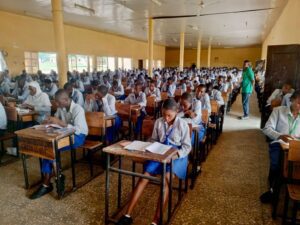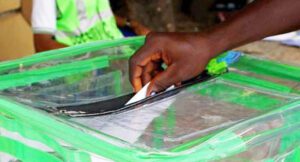COVID-19 third wave: Citizens’ obligations, Government’s liveliness to duty, key to forestall uncontrollable resurgence
Clouds have continued to gather with the increasing number of cases testing positive to COVID-19 in the past few weeks in Nigeria. The increase in the records of profile against the cheer of the flattening of the pandemic which informed relaxation of social restrictions and safety protocols, particularly in the first quarter of the year, has begun to attract a change in narrative. Experience from the Delta variant of the virus which has been confirmed in the Country has brought new narratives to the pandemic. Emerging dynamics greeting the wave of the pandemic have begun to raise new realities, with the discovery of the highly transmissible COVID-19 (SARS-CoV-2) Delta variant, also known as lineage B.1.617.2. The COVID-19 Delta variant, first detected in India in April, is considered now to be the most transmissible variant which has now spread to about 100 Countries across the world. The variant is now responsible for more than 90 per cent of all new infections in the United Kingdom and about 30 per cent in the United States.
The rising dynamics visiting the records of increasing cases in the past few weeks, have begun to send signals of a third wave of the pandemic in Nigeria. Following the dousing of tension with the flattening of the curve of the virus in the second wave, easing of safety protocols and guideline directives have taken effect beginning from the end of March. The Delta variant which has been noted to be very much more potent in spread possibilities, have dealt huge blow on some Western and Asian Countries.
Recently, infections in Nigeria have begun to record over 100 cases on daily test statistics. As at Monday, statistics from the Nigeria Centre for Disease Control (NCDC) reports that “till date, 171,111 cases have been confirmed, 164,789 cases have been discharged and 2,132 deaths have been recorded in 36 states and the Federal Capital Territory.” This was arrived at, with the addition of 216 COVID-19 infections recorded on Sunday July 25, 2021. Last Friday, it was stated that 184 additional new cases were reported from seven states and the Federal Capital Territory (FCT). The NCDC Friday’s report had contained that: “Lagos State where a majority of the cases were picked on Thursday reported 124, Rivers registered 27, Sokoto announced 9; while the FCT and Oyo recorded 8 and 6 each.Amongst others were; Ekiti announced 5, Delta reported 4, while Plateau recorded 1.” Last Wednesday, July 21, 238 cases were confirmed following test.
Minister of Health, Dr Osagie Ehanire, had last week during a virtual press conference organised by the Africa Regional office of the World Health Organisation (WHO) facilitated by APO Group, noted that Nigeria has begun to see a pandemic of two tracks – where the Delta variant is tearing through unvaccinated populations. He had maintained that though the Delta variant, tagged a variant of concern by the WHO was first detected two weeks ago, Nigeria is seeing an increase in the number of new cases.
The Minister who reiterated the unfortunate surge in cases in India a few months ago and regretted that a similar surge is now being seen in most African countries, noted that despite the support by the COVAX Facility led by WHO, CEPI, GAVI and UNICEF which have so far delivered 3.9 million vaccine doses to Nigeria, the Country and most other African countries have continued to suffer from the gross inequity in global vaccine access.
Beyond Lagos, the increase in infections in States which hitherto have been recording insignificant cases is beginning to attract attention. It would be recalled that last Thursday, the Secretary to the State Government (SSG) and Chairman, Akwa Ibom State COVID-19 Management Committee, Dr Emmanuel Ekuwem, had disclosed that the Delta variant had claimed three lives in the State in the past two weeks. Ekuwem who made it known in Uyo, that the three deaths were among the 156 cases that tested positive within the period, had noted that the increase, calls for renewal of collective effort at preventing the spread of the virus infection in the state.
He was quoted, “Over the past two weeks, cases of COVID-19 within the state have risen from five to 156. This increase, when considered in the light of the Delta variant of the virus, which has now been isolated in Nigeria, calls for a renewal of our collective effort at preventing the spread of COVID-19 virus infection in our state. Accordingly, the government calls on all citizens of the state to obey all COVID-19 guidelines and protocols earlier enunciated by the state government and the Nigerian Centre for Disease Control, NCDC. All non-essential social gatherings should be reconsidered with the view to drastically reducing the scale and scope or suspending same at this time. These include: burials, weddings, birthday celebrations etc.”
It is known that less than two percent of the population in Nigeria have been vaccinated. The risk that an elaborate spread of the virus pose to Nigeria would be inconceivable should the pandemic be allowed to spread beyond control. It is incontrovertible that the the management of COVID-19 has come with depth of huge cost. The allocation and deployment of large share of resources to addressing COVID-19 related matters is by all means undesirable to the Country. The degree of such undesirability is conceivably deep seated when perspective is given to the depth of socio-economic matters demanding attention in the Country as against the troubles of a pandemic.
The prevailing situations in the Country have waxed too gross beyond being further compounded with stronger strains from overbearing impacts of the COVID-19 pandemic. Hence, the necessity for the Government to take firm position towards appealing to the sensations of Nigerians on the need to nurture preventive orientations towards containing the spread of the virus is significant. It is evident by observations that majority of Nigerians have not yet reconciled with reckoning with the necessity to adhere to the established safety protocols. The irreconciliation, to a very large extent, can be linked to the recalcitrant disposition to resistng the directives and coordinating protocols. The resistance against guidelines which recently have become deep seated demands that the Government, beyond enforcement, blend strategic measures to appeal to the senses of Nigerians to find reasons why they have to become responsible for their own individual and popular/communal safety in the interest of the Country. Channeling resources, which would have gone a long way in vitalising the economy, to containing a pandemic is undesirable for the Country.
It is important for Nigerians to reason with the Government to take responsibility under obligation as civilised citizens in the fight to flatten the curve of the virus. The need for all citizens to become conscious of the necessity to propel individual and popular safety by cautiousness is imperative. While it behooves the Government to awaken enforcement in ensuring compliance to containment directives and guidelines, it is more important for citizens to abide by the established protocols such as, washing of hands, physical distancing, wearing of face masks, maintaining proper hygiene, among others. Since citizens as encoded by law do have their rights and obligations, Nigerians should arise to fulfilling their obligations, beyond just clamouring for rights. On the part of the Government, it is pertinent that it awake to duty by being at the top of situations to take firm grip in regulating activities at the helm of threat zones requiring stern directives, such as those bordering on entry points into the Country, social gathering, commuting, among others.




